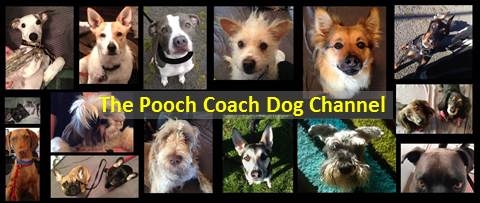|
|
Dog Training
Tips

Dog Training Tips
-
Start
training your puppy early on. While old dogs can be taught
new tricks, what's learned earliest, is often learned quickest
and easiest. Moreover, the older the dog, the more bad habits
will likely need to be "un-learned". When it comes
to raising and training a dog, an ounce of problem prevention
is certainly worth a pound of cure!
-
Train
your dog gently and humanely, and whenever possible, teach
him using positive, motivational methods. Keep obedience sessions
upbeat so that the training process is enjoyable for all parties
involved. If training your pooch is a drudgery, rev things
up a bit, and try the "playtraining" approach: incorporate
constructive, non-adversarial games (such as "Go Find",
"Hide 'n' Seek", retrieving, etc.) into your training
sessions.
-
Does
your dog treat you like "hired help" at home? Does
he treat you like a human gymnasium when you're sitting on
the furniture? Does he beg at the table? Jump up on visitors?
Demand your attention by annoying you to death? Ignore your
commands? How well your dog responds to you at home affects
his behavior outdoors as well. If your dog doesn't respond
reliably to commands at home (where distractions are relatively
minimal), he certainly won't respond to you properly outdoors
where he's tempted by other dogs, pigeons, passersby, sidewalk
food scraps, etc.
-
Avoid
giving your dog commands that you know you cannot enforce.
Every time you give a command that is neither complied with
nor enforced your dog learns that commands are optional.
-
One
command should equal one response, so give your dog only one
command (twice max!), then gently enforce it. Repeating commands
tunes your dog out (as does nagging) and teaches your dog
that the first several commands are a "bluff '. For instance,
telling your dog to "Sit, sit, sit, sit!", is neither
an efficient nor effective way to issue commands. Simply give
your dog a single "Sit" command and gently place
or lure your dog into the sit position, then praise/reward.
-
Avoid
giving your dog combined commands which are incompatible.
Combined commands such as "sit-down" can confuse
your dog. Using this example, say either "sit" or
"down". The command "sit-down" simply
doesn't exist.
-
When
giving your dog a command, avoid using a loud voice. Even
if your dog is especially independent/unresponsive, your tone
of voice when issuing an obedience command such as "sit","down"
or ""stay", should be calm and authoritative,
rather than harsh or loud.
NOTE: Many owners complain that their dogs
are "stubborn", and that they "refuse to listen"
when given a command. Before blaming the dog when he doesn't
respond to a command, one must determine whether or not: a)
the dog knows what the owner wants, b) he knows how to comply,
c) he is not simply being unresponsive due to fear, stress
or confusion.
-
Use
all food or other reward-giving occasions as opportunities
to train. This provides simple on-going training that can
be reinforced regularly. Examples: Always make him do a sit
and stay before eating his meals or before going out for a
walk. When giving treats, always practice commands. Practice
commands during playtime as well. Make training part of each
day.
-
Correct
or, better yet, prevent the (mis)behavior, don't punish the
dog. Teaching and communication is what it's all about, not
getting even with your dog. If you're taking an "it's-you-against-your
dog, whip 'em into shape" approach, you'll undermine
your relationship, while missing out on all the fun that a
motivational training approach can offer. Additionally, after-the-fact
discipline does NOT work.
-
When
training one's dog, whether praising or correcting, good timing
is essential. Take the following example: You've prepared
a platter of hors d'oeuvres for a small dinner party, which
you've left on your kitchen counter. Your dog walks into the
room and smells the hors d'oeuvres. He air-sniffs, then eyes
the food, and is poised to jump up. This is the best, easiest
and most effective time to correct your dog: before he's misbehaved,
while he's thinking about jumping up to get the food.
-
Often,
dog owners inadvertently reinforce their dogs' misbehavior,
by giving their dogs lots of attention (albeit negative attention)
when they misbehave. Needless to say, if your dog receives
lots of attention and handling when he jumps up on you, that
behavior is being reinforced, and is therefore likely to be
repeated.
-
Keep
a lid on your anger. Never train your dog when you're feeling
grouchy or impatient. Earning your dog's respect is never
accomplished by yelling, hitting, or handling your dog in
a harsh manner. Moreover, studies have shown that fear and
stress inhibit the learning process.
Check out our YouTube Channel for video tips!
info@poochcoach.com
Phone:
415-643-3333
|
|

